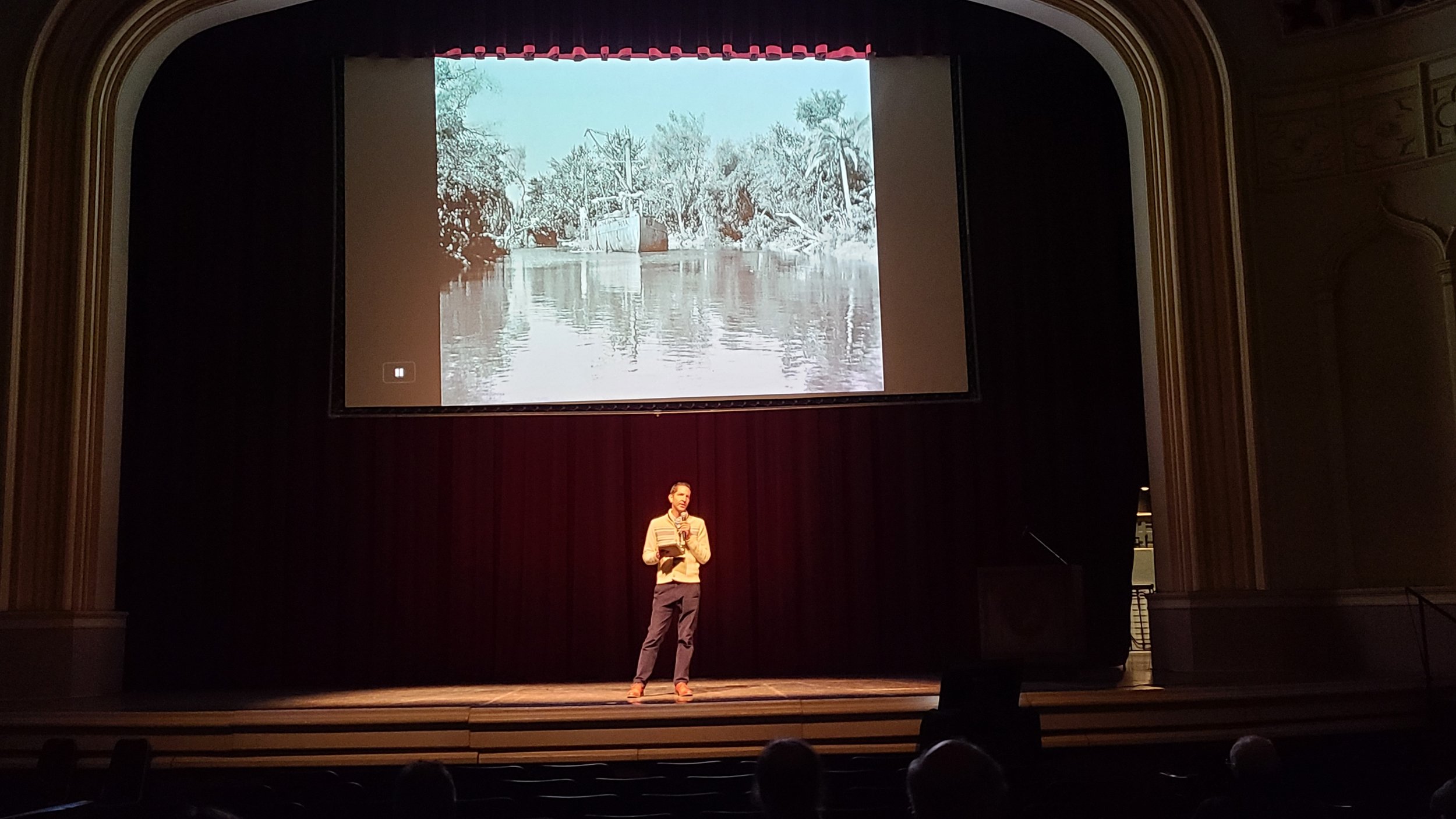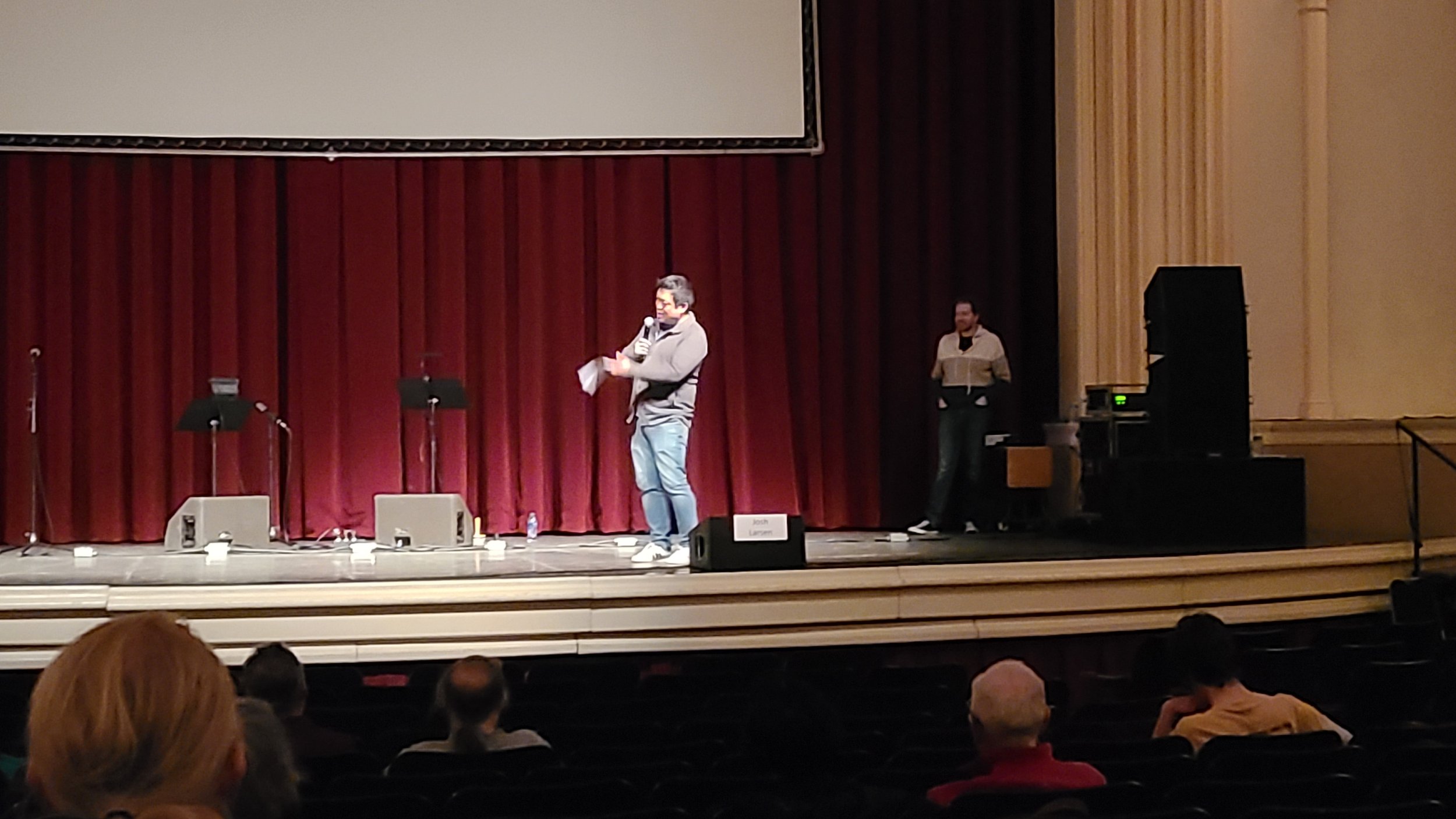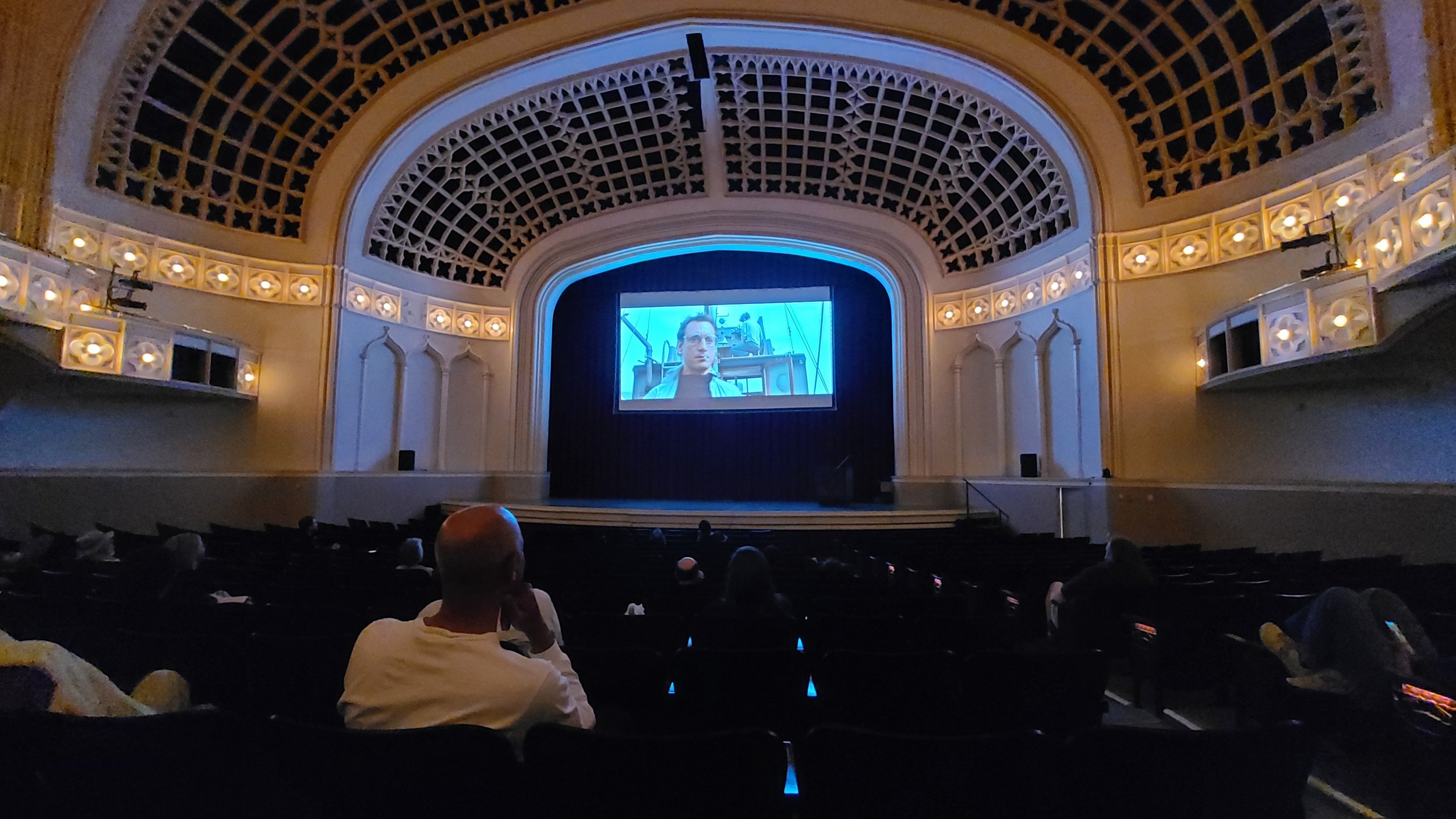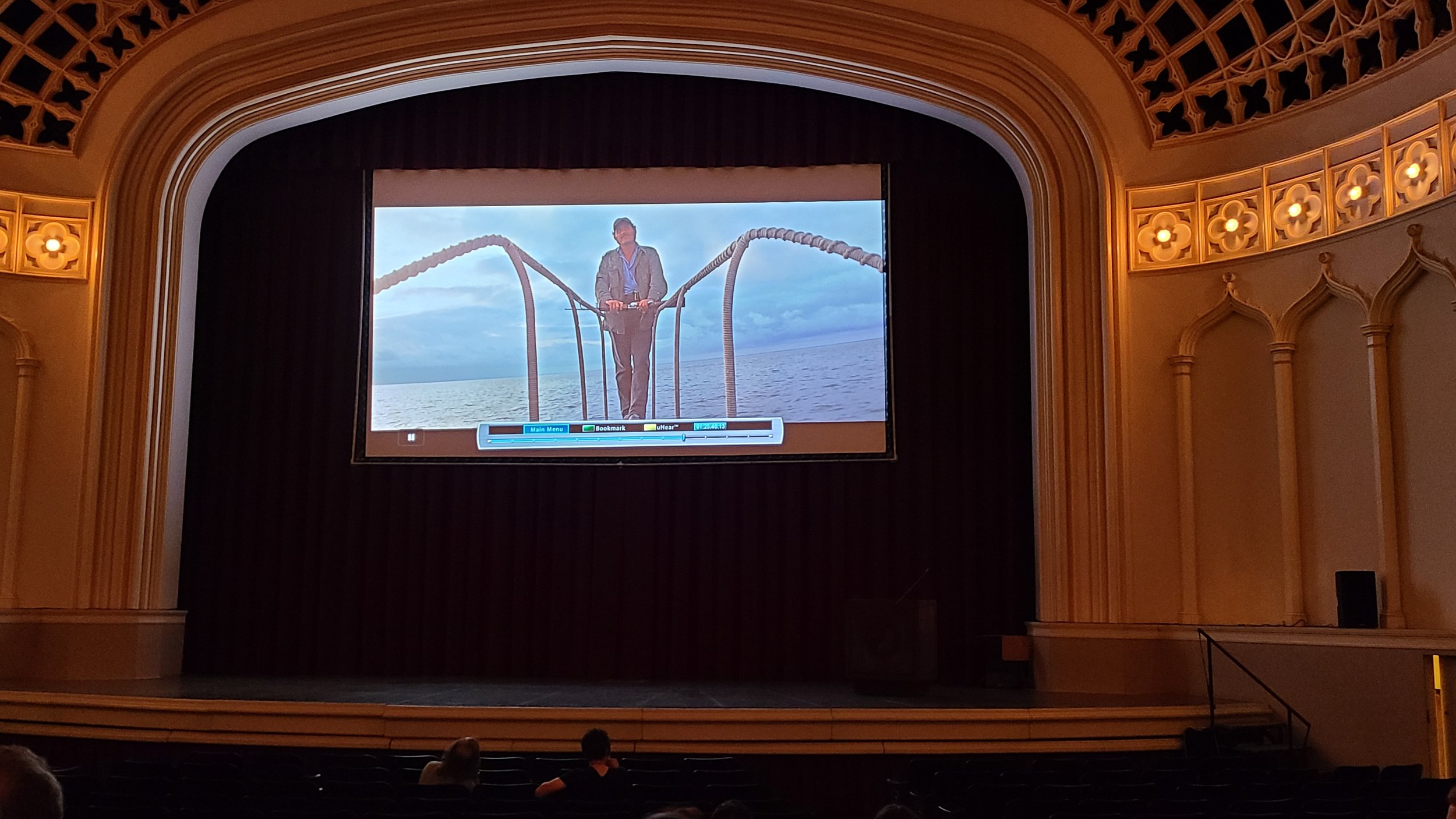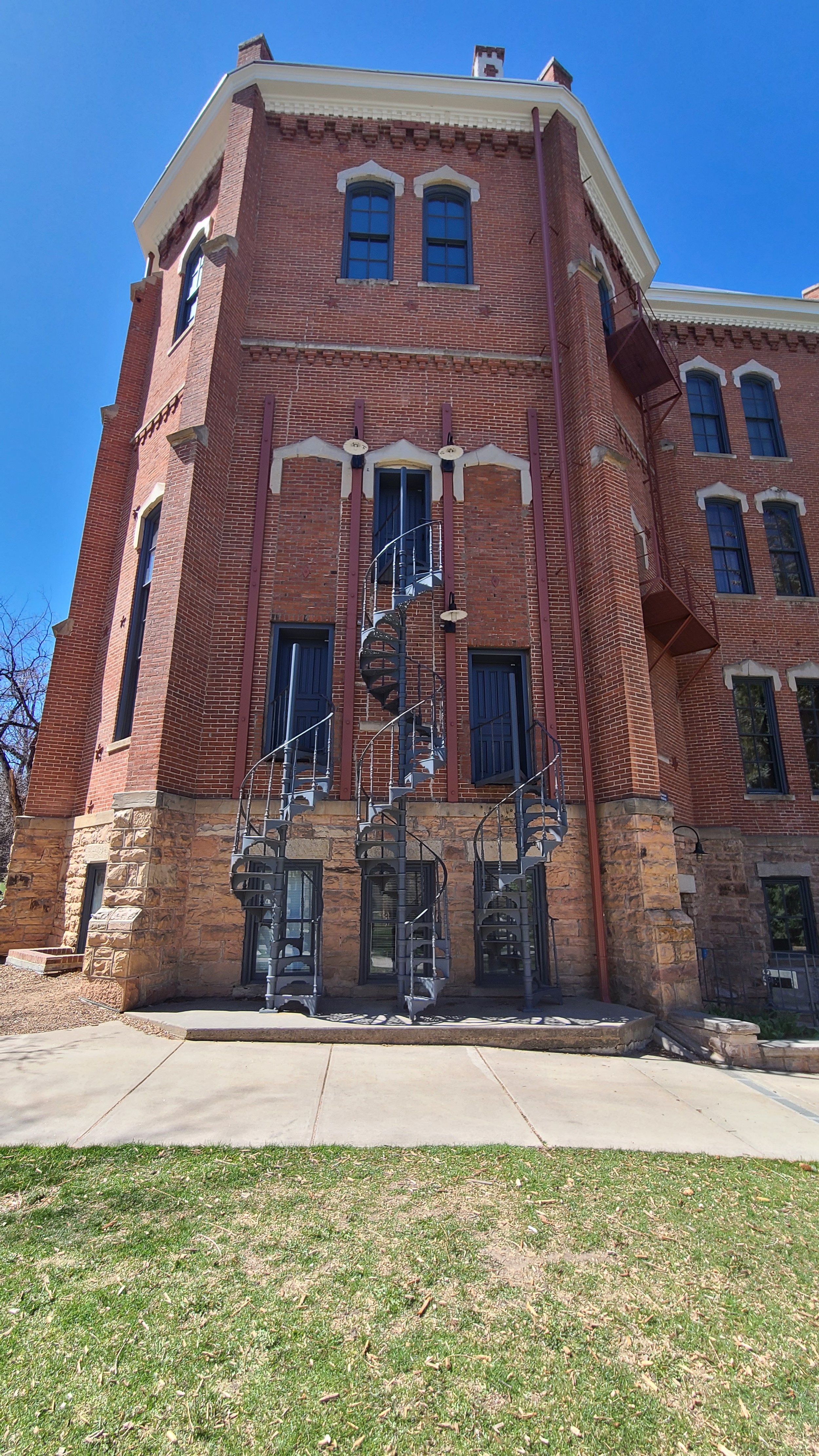Josh Larsen at Ebert Interruptus 2022. (photo by the author.)
I don’t think I knew what Ebert Interruptus was until 2013, when Roger Ebert died. In the myriad obituaries and tributes dedicated to the film-criticism titan that I read in the wake of his passing, I saw a few mentions of what was, at the time, still called Cinema Interruptus. What I read seemed to hold an almost mythic quality to it.
Ebert Interruptus is one event of dozens that make up the Conference on World Affairs, which is held each year on the University of Colorado at Boulder campus.
Every year from 1975 to 2006*, Roger Ebert would screen a film in a unique way. On the first of the five-day conference – the 2022 iteration was four days, April 6-9 – he would screen the film in the usual way, start to finish with no interruptions.
On days two through five, he would screen the film again. During these days, any member of the audience could call out “STOP,” and the person running the projector would pause the movie so that said audience member could offer up an analysis, observation, critique, or other comment about what was on the screen at that moment. Ebert, in his 2008 breakdown of the process, titled “How to Read a Movie,” credited the CWA’s founder, Howard Higman, with describing Interruptus as “democracy in the dark.”
I read the few descriptions of this event that I came across in 2013 with a sense of wonder and, ultimately, regret. This was something that sounded right up my alley, but I would now never get to experience it in person due to Ebert’s passing.
In 2013, I was at the tail end of what I call my cinematic dark period. (Improbably, I cribbed the term from the host of a sports-talk radio station that I listened to during my flirtation with being a dedicated sports fan**. The host, who was in his early 60s at the time, jokingly described a period of a decade or so in the late ‘90s and early 2000s, when he turned his back on popular entertainment, as his “dark period.”)
My own dark period was the result of a personal existential unmooring. I had graduated from the University of North Texas in 2005 with a bachelor’s degree in Radio, Television, and Film. (At some point in the last 17 years, UNT changed the name of that degree path to the infinitely blander “Media Arts.” It’s probably silly, but I am ridiculously proud and thankful that my degree has the word “film” printed on it.)
I knew towards the end of my time in college that film production probably wasn’t for me. I’m an introvert (with occasional short, intense bursts of extroversion), and networking – what was once colloquially known as schmoozing – doesn’t come easy to me. So, yeah, that would make a career in production, where ¾ of the work you get depends on who you know and on being able to impress someone in a very short amount of time, a difficult proposition. I’m also not very good under pressure. (You’re probably wondering what the actual hell I was thinking in deciding to study film production. I love movies, so it seemed like the natural thing to do.)
I had resigned myself to working a soul-crushing, mind-numbing cubicle job for the rest of my life. At least that would be better than retail – I worked at a video rental store (kids, watch the documentary The Last Blockbuster on Netflix to learn about the stores that once ruled the entertainment landscape) – where I was stuck for almost five years after graduation. During this period, roughly 2006-2015, I certainly went to the movies and watched movies at home. The advent of services like Netflix, and what, at the time, the service called their new invention, “Netflix View Instantly” (You can watch movies and TV shows on the internet?!? WHAT?!?) was making it easier and easier to access titles. But the passion I had before and during college had mostly evaporated. After the internet-based liberal-talk radio station I worked for – hey, it wasn’t movies, but at least I could say I was working in a field that I studied in college – went belly-up in 2010, I felt completely disconnected from movies and anything else I learned at UNT.
Rae, my then-girlfriend (now-wife) started the excruciating and uphill work of convincing me to do something about that disconnection, so that I might be happier and more fulfilled. Her Herculean efforts could be detailed in an essay all their own, but to make a long story short (too late!), she was successful in making me believe in myself enough to start this website, and I owe her immeasurably for it. The last 7+ years of writing film criticism have made me feel connected to movies in a way I thought was gone forever.
(Side note: I’ve started to realize (and regret) in the last year or so how much time I wasted in finding my calling, even if only as an avocation. If I had made film criticism the focus of my c. 1997 GeoCities website (you’ll have to ask your parents about that one, kids) instead of a damned X-Files fan page, who knows where I’d be now. I can honestly say I have no desire to be a filmmaker any longer. My happy place is watching and writing about movies, not making them.)
This year, Rae stepped up once again to convince me to take action. What’s now called Ebert Interruptus, in honor of the man who created it, has been conducted for five years by Josh Larsen. The Chicago-based film critic is one of the hosts of the only movie podcast I listen to regularly, Filmspotting. Every February or March, Larsen teases the event on the podcast, and this year it came up in casual conversation between Rae and me, and I described to her how Interruptus works. We’re both overthinkers, but when it comes to something that would make someone who she loves happy, she never hesitates (it’s one of her most endearing traits).
She simply said, with less than a month before the start of this year’s CWA, “We should go.” That’s practically last-minute for us. I had the PTO, and we have no kids to look after, so at the beginning of April we packed up our dog and drove to Boulder from Dallas.
The altitude change and resultant static electricity didn’t do Cooper’s hairstyle any favors. Luckily, he spent most of the week in seclusion in the west wing of the Airbnb we rented. (photo by the author’s wife.)
In addition to Interruptus, we attended four panel discussions during the conference. They were all creativity/entertainment focused – a few examples by title: “The Magic of Creativity” and “Pop Culture: What’s Left to Talk About?” – but there were many different subjects up for discussion. Other panels available were: “Still the Least Dangerous Branch? Reflections on the Supreme Court and the Constitution” and “Climate Change: Threats to Biodiversity.” After the first jam-packed day of panels, we mostly relaxed at our Airbnb for the rest of the week. It was a vacation after all. (Although I jokingly called it a “working vacation” because I spent the first two hours of every morning writing.)
We didn’t miss a minute of Interruptus.
Larsen officially got us going with some production and exhibition history of the movie that was about to get the Interruptus treatment, Steven Spielberg’s 1975 Blockbuster hit – the term was coined because of this movie – Jaws.
The comments from Larsen – his main source material for tidbits and insights into the production came from the book The Jaws Log, by the movie’s co-screenwriter Carl Gottlieb – were interesting and expertly presented. (I have resolved to get a copy of The Jaws Log so I can read it for myself.)
On the second day – the first day of interrupting – Larsen brought on a special speaker. The Denver-based film critic Walter Chaw told of his personal history with Jaws – I highly recommend reading Chaw’s review for the recently released Everything, Everywhere All at Once; it’s one of the most emotionally vulnerable, personal film reviews I’ve ever read.
Walter Chaw at Ebert Interruptus 2022. (photo by the author.)
Chaw’s insights were many and interesting. I didn’t discover until after that day’s session that Chaw also narrated the final episode of the David Fincher-produced Netflix limited series Voir, a collection of video essays about different topics in film. In his episode, “Profane and Profound,” Chaw dissects the racial politics of 1982’s interracial buddy-cop movie 48 Hrs., starring Eddie Murphy and Nick Nolte. The episode is wonderfully incisive; seek it out, and you’ll get a flavor for Chaw’s speech at Interruptus. (Coincidentally, the first episode of Voir, “Summer of the Shark,” is a love letter to Jaws. All six episodes of Voir that are currently available are excellent. I can’t recommend them highly enough.)
The end of the second day had me worried. We only got through 20 minutes of the movie, meaning we had to get through almost double that for each of the remaining two days. My completist-driven brain was starting to sweat.
Besides the behind-the-scenes information that Larsen offered up, he also shared deep critical insights into the movie. One involved the idea that because Jaws is acting so strangely for a shark – it turns up in waters not normally inhabited by great white sharks, it has the relentlessness and determination of a serial killer – it’s possible to make a supernatural/theological reading of the animal. Jaws can be seen as not only a force of nature gone berserk, but a manifestation of evil itself. (Larsen’s day job is as editor/producer for the pop culture-focused website Think Christian, and this atheist thought every religious-themed observation that Larsen made was fascinating.)
The audience – including myself and Rae – jumped in with plenty of observations as well. One person commented on the meticulous use of the color red in the movie’s color palette. Another mentioned the heightening of tension in one scene due to John Williams’s iconic score being absent for a few crucial minutes. Yet another observed that the mayor of Amity Island in the movie has BTCE (Big Ted Cruz Energy; as a constituent of one of the vilest and most hated of all U.S. Senators, I particularly enjoyed that one. I suppose Ted Cruz could be described with the original BDE, but with a very different connotation.).
I didn’t avail myself of the opportunity to do a mini-standup routine for the 60-70 people in attendance during the event. To wit: Every mind-numbing office job I’ve ever worked has included a fair share of group meetings. At the end of those meetings are invariably open calls for questions. I’ve always fantasized about being at the back of the room and quietly raising my hand as I deliver one of my favorite lines from the movie, “What about the beaches, chief,” with no other context or explanation, to see who gets it and who looks at me like I’m a lunatic. I opted not to call out “STOP” in the wake of that line being delivered.
Some people weren’t as interested in refraining from off-topic (and off-color) jokes during Interruptus. When someone mentioned that an extra in the movie with a bushy 70s mustache looked familiar, one gentleman chimed in with, “He’s a porn star.” My eyes practically rolled right out of my head. Luckily, moments like that were very few and far between.
We ended up making it all the way through Jaws by the end of Saturday’s session, going over by only a few minutes. That evening, there was a Filmspotting meetup at a local restaurant/bar called The Sink where myself, Rae, Larsen and 10 or so other listeners casually chatted and sipped on drinks. It’s the closest, since college, that I’ve felt to the little girl in the bumblebee costume at the end of the video for Blind Melon’s song No Rain. I’m talking about the moment that she finally finds everyone else who’s wearing a bumblebee outfit and finally feels like she’s home.
Ebert Interruptus was a bucket-list item for me. I regret not being able to take part in one of the iterations that Roger Ebert hosted, but Josh Larsen did a fantastic job of filling those immeasurably large shoes. He’s continuing a unique and inquisitive tradition that brought me closer to the art form I love so much. I have dreams of (maybe, possibly) some day writing a book about the movies. Ebert Interruptus gave me a template for how to approach close reading and deep analysis of film texts. It’s an experience I’ll never forget. My cinematic dark period is over. With enough focus and determination, I’ll make sure it doesn’t return.
Jaws at Ebert Interruptus. (Photo by the author.)
Jaws at Ebert Interruptus. (Photo by the author.)
Part of the University of Colorado at Boulder campus. (Photo by the author.)
A few stray thoughts that didn’t make it into the essay:
- After we got home, when I mentioned that Josh Larsen is an A#1 fan of Wes Anderson, Rae said, “Yeah, you can tell from the clothes and the shoes.” If he reads this, I want him to know she meant that not as an insult, but in an endearing way.
- One audience member joined a day late, but after exchanging tweets with Larsen, he decided to make the trip from nearby because he hosts a podcast that breaks down Jaws one minute per episode. It’s called Let’s Jaws for a Minute.
- If you’re ever anywhere near Denver, get thee to a Denver Biscuit Company. That place is amazing.
- Boulder is a charming little town.
- Driving fifteen hours straight on the trip back was a mistake. We had regrets.
- From Wikipedia: “Ebert announced a plan to analyze Fellini's film [La Dolce Vita] at the conference every ten years or so.” The last time La Dolce Vita was screened at Interruptus was 2005…
- I’m half expecting the only comment on this post to be Adam Kempenaar asking a single question: “Why don’t you also listen to The Next Picture Show regularly?”
Footnotes:
* Ebert’s last appearance at the CWA was 2010, and by then he was more of a guest figure at Interruptus instead of the host, due to his failing health.
** Go Texas Rangers! (I stopped following sports in any meaningful way by 2018 or so.)

